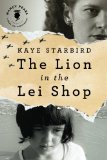Summary | Excerpt | Reviews | Beyond the Book | Readalikes | Genres & Themes | Author Bio

Now, if I care to, I can picture the lei shop the way it really was, the way it used to be before the lion moved in, before the air raid. Later, people called the air raid Pearl Harbor, but Pearl Harbor was different. Pearl Harbor was the sudden place beyond the black cane fields, the sudden daylight that couldn't be daylight over the sudden silver-and-orange sea. Somebody else's business. When any of us spoke of December seventh, we spoke of the air raid. It was the name we had for the thunder that wasn't thunder and the planes and the men in the planes. It was when everything stopped being usual and right, when everything changed.
Before the air raid, I could look through the back window of my bedroom to the road that led away from Schofield Barracks and see the two big happy Hawaiian women sitting on their wooden benches in front of the lei shop, stringing blossoms into necklaces all day long in the sun. The lei shop wasn't a real house, not a real store, just sort of a playhouse-size shack where I guess the extra flowers were kept. I don't know for sure, because I never went behind the awninged area where the brown and smiling women sat forever threading their flowers. I liked the women. I liked seeing them and knowing they were there, as I liked the colored butterflies patterned over and over again on my bedroom wallpaper or the poinsettia trees outside my second-story windowsill. The women used to laugh together, and sometimes they called to soldiers passing in the road.
A week after the planes came, the flower shop was closed and barbed wire was twined around it in thorny metal coils. And when I asked Willard Seymour, the twelve-year-old boy who lived next door to me, what had become of the brown and smiling women who threaded the carnation and pikaki and ginger blossoms all day long in the sun, Willard said they were gone and wouldn't ever be back. The fact was, said Willard (Willard always said "the fact was"; he picked it up from his father); the fact was, he said, watching me carefully as he spoke, a lion had eaten the women…biting their heads off first, then crunching the rest of them slowly and quietly, arm by arm and leg by leg, until there was nothing left but the women's shoes. The lion didn't care much for shoes, said Willard; shoes didn't have any juice to them. What he really liked was eating people, little girls mostly but women in case he couldn't find any little girls. According to Willard, the lion was living in the lei shop and could see through a crack in the wall as he held up his heavy maned head in the windowless darkness, restlessly twitching his tufted, slashing tail. He knew how to open the door with his teeth and was waiting there with his eye to the crack, ready to spring through the door and over the wire to catch anyone else who happened to wander by. Well, not so much men and boys, said Willard. The fact was, the lion usually let men and boys alone; they were too tough to chew. What he was mainly hoping to catch was a little girl, so he could crunch her even more slowly than he had crunched the unsuspecting flower women, not only arm by arm and leg by leg, but eyeball by eyeball and ear by ear and finger by finger and toe by toe, until there was nothing left but a pair of sad little sandals and maybe a sock.
"He likes girls about your size," said Willard, and the only expression on his face was a growing glint in his marble eyes.
"Girls with curly red hair," he added thoughtfully. "Like yours."
I never went near the lei shop again, but even as far away as my house I felt threatened. I didn't like to look out the window anymore, but there the window was. You can't hide a window except by pulling the shade, and then the shade reminds you of why you pulled it. I'm not sure why I'm going into all this, because my window didn't have a shade. It was a many-paned French window that opened inward on hinges, and the only way I could avoid seeing it was to stay out of my room.
Excerpted from The Lion in the Lei Shop by Kaye Starbird. Copyright © 2013 by Kaye Starbird. Excerpted by permission of Amazon Publishing. All rights reserved. No part of this excerpt may be reproduced or reprinted without permission in writing from the publisher.
Your guide toexceptional books
BookBrowse seeks out and recommends the best in contemporary fiction and nonfiction—books that not only engage and entertain but also deepen our understanding of ourselves and the world around us.